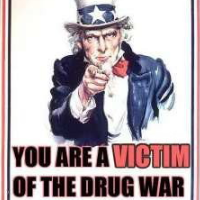Governor Pardons 104 for Christmas, Many Casualties from the War on Drugs

‘Tis the season to be generous and forgiving, but there are limits.
Governor Jerry Brown’s office released his Christmas Eve roster of pardons (pdf) Wednesday for 105 convicted felons who have been clean for 10 years, then revoked the pardon for one who belatedly turned up on Santa’s naughty list.
Shortly after the governor’s list was released Wednesday, the Los Angeles Times alerted Brown’s office that Glen Williams Carnes, who served three years probation for possession of a controlled substance for sale in the late 1990s, had not “exhibited good moral character, and conducted himself as a law-abiding-citizen,” as his pardon stated.
Carnes was disciplined by the Financial Industry Regulatory Authority, the private-sector regulator of all securities firms doing business in the United States, in May 2013, according to the Times. He didn’t admit guilt, but signed a consent form agreeing to be barred from working with financial investment advisors over allegations he misled investigators looking at his business dealings.
The governor’s office does a lot of pardons compared to his immediate predecessors. Brown is up to 509 since he took office. Arnold Schwarzenegger, Gray Davis and Pete Wilson issued a total of 29 in two decades. Before them, George Deukmejian pardoned 325 and Reagan 574. Brown issued 404 during his first tenure.
The vetting process is not transparent but is thought to usually include the Board of Parole Hearings. In this case, it did not. The Times reported that Brown spokesman Evan Westrup said the governor relied solely on the certificate of rehabilitation issued to Carnes by the Orange County Superior Court in 2013.
Carnes was one of the 65 people on the list convicted of drug-related crimes. That’s 61.9% of the total, which dropped to 61.5% when the government withdrew his pardon.
Forty-three of the offenses were for possession of enough drugs to merit a mention of sales. Twelve of the pardoned were convicted of drug transportation for sale, five for drug cultivation and five for drug manufacture. Burglary was the largest category of nondrug-related pardons. There were 10, followed by grand theft (6), robbery (5) and assault with a weapon (5).
The pardon reports released by the governor’s office do not offer very many crime details, so it isn’t readily apparent from the category what the transgression actually was. But many of these people being pardoned were busted when the War on Drugs was filling California prisons beyond the capacity for humane incarceration.
Mandatory minimum sentences and harsh penalties were imposed for possession, transportation and sale of drugs. The state put nonviolent offenders behind bars or ruined their lives with stigmatizing records that couldn’t be hidden from employers, business associates or the government. Many of the convicted received probation.
Only under intense pressure from the federal courts to reduce prison overcrowding has the state reluctantly reduced the penalties for some drug and nonviolent crimes. The long war has given Governor Brown ample opportunity to play Santa Claus at Christmas.
–Ken Broder
To Learn More:
Jerry Brown Pardons 105 Convicted Criminals (by Melody Gutierrez, San Francisco Chronicle)
Man's Pardon Withdrawn after Times Discloses Financial Regulators' Censure (by Paige St. John, Los Angeles Times)
Jerry Brown Issues 105 Pardons, Many for Drug Crimes (by Judy Lin, Associated Press)
Governor Pardons 105, 11 from San Diego (by Dana Littlefield, U-T San Diego)
Drug War Is Filling Prisons with Women (by Noel Brinkerhoff and Steve Straehley, AllGov)
- Top Stories
- Controversies
- Where is the Money Going?
- California and the Nation
- Appointments and Resignations
- Unusual News
- Latest News
- California Forbids U.S. Immigration Agents from Pretending to be Police
- California Lawmakers Urged to Strip “Self-Dealing” Tax Board of Its Duties
- Big Oil’s Grip on California
- Santa Cruz Police See Homeland Security Betrayal in Use of Gang Roundup as Cover for Immigration Raid
- Oil Companies Face Deadline to Stop Polluting California Groundwater





